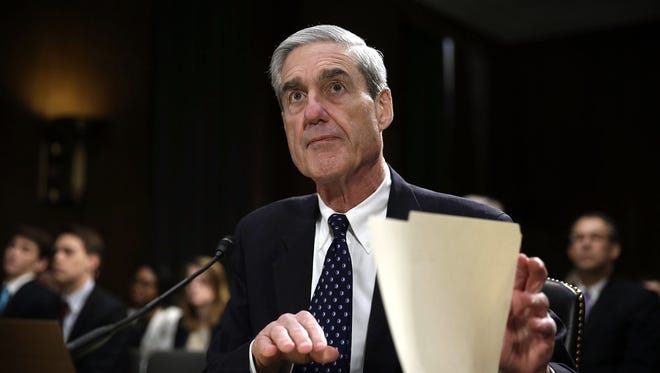Special counsel Robert Mueller is bad news for Donald Trump — and Russia
Putin wanted America in chaos and got it. But his winning streak is about to end.

The Justice Department has now appointed former FBI director Robert Mueller as special counsel to look into any connections between President Trump’s campaign and the Russian government. While some of the more extreme Trump defenders (like CNN’s ridiculous Kayleigh McEnany) are trying to slap a happy face on the announcement, otherwise rational observers know that this is bad news for a White House that will now be living with the Russian issue for months, if not years, to come.
But there’s one other president for whom the Mueller appointment is bad news: Vladimir Putin, leader of the Russian Federation. Spies do their best work in the shadows, and the last thing the Kremlin wants right now is a spotlight in the hands of a tough and experienced former FBI director.
The best kind of sabotage is the kind that does its damage without being discovered, and so far, the Kremlin has had a free ride. That scope and intensity of Russian involvement in American politics, from the ubiquitous dirty money of Russian mobsters to the operations of Russia’s intelligence services, has been clouded in the miasma of the multiple scandals now engulfing the Trump White House. When several scandals break in the space of a week, no one has the time to follow the money.
Until now, Congress and the American people have not had the resources or the tenacity — or in some cases, the desire — to examine the intricate personal relationships, confusing money trails and esoteric Internet chicanery that constitute Russia’s campaign of political warfare against the United States. This lack of interest suited Putin just fine, since his goal has been to smear and discredit the American system without revealing Russia’s hand.
In reality, of course, the Russian president and his intelligence services have been conducting relentless political warfare for years not only against America but its NATO allies. From the Kremlin’s wide-eyed pretense to knowing nothing about American defector Edward Snowden to its arms-length puppetry of WikiLeaks, the Russians have been on a winning streak against the West that culminated in their brazen interference in the U.S. presidential election of 2016.
Are Trump voters ruining America for all of us?: Tom Nichols
How the White House Russia secrets endanger Donald Trump
Americans are not capable of thinking rationally about what happened in 2016 because they are too close to it. Hillary Clinton’s voters will never accept that Putin did not change the outcome of the election, while Trump loyalists will never give an inch on the idea that Russia — treated now by the president as a friend with whom we can share intelligence — tainted a campaign that they feel their man worked hard to win fair and square. In reality, what the Russians wanted was to see the vaunted institutions of American democracy in chaos, and they got it.
Russia’s winning streak, however, could be over. For years, the Russians were gaining maximum effect with minimum exposure, but they are now on the other side of that curve, with potential costs mounting and benefits evaporating. The first warning sign was the French election, in which a huge dump of emails at the last minute had no effect on the outcome. (Sound familiar?)
The appointment of a U.S. special counsel is an especially worrisome development for Russia and its spooks. Unlike a congressional or bipartisan commission that would have to accommodate partisan interests and negotiate the scope of its inquiries, Mueller has a wide remit to follow Russian paths into American politics wherever they go. And he will likely find that those paths are many and deep.
POLICING THE USA: A look at race, justice, media
Donald Trump's Russia blunder is horrifying
Whether Mueller’s work results in indictments of Americans or a complete exoneration of the president’s campaign organization is, in a fundamental sense, unimportant to the Russians. More important to the Kremlin is that we are going to find out things about Russian intelligence and mafia activities — often indistinguishable from each other — that Moscow’s elites would rather have remained hidden. They will involve secrets and methods the Russians do not want investigated, and especially not by an FBI veteran.
Perhaps the people who have the most to worry about are those who have served, until now quite profitably, as the links between the Russian dictator and the American political system. Putin is not only a former intelligence officer, he is also a mafia boss. Men at the top of such organizations do not hesitate to protect their interests in the most certain way possible. The appointment of a special counsel is likely causing as much anxiety in some quarters in Moscow as in Washington — but for very different reasons.
Tom Nichols, a Russia expert and a professor of national security affairs at the Naval War College, is author of the new bookThe Death of Expertise. The views expressed here are solely his own. Follow him on Twitter: @RadioFreeTom
You can read diverse opinions from our Board of Contributors and other writers on the Opinion front page, on Twitter @USATOpinion and in our daily Opinion newsletter. To submit a letter, comment or column, check our submission guidelines.